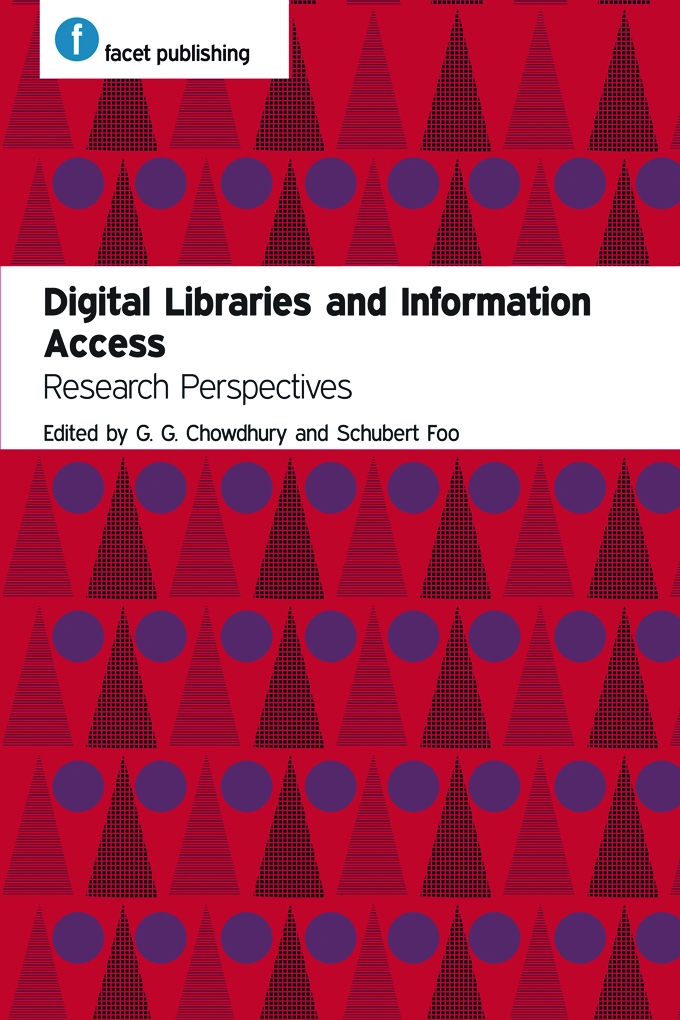Book contents
- Frontmatter
- Contents
- Foreword
- Editors and contributors
- 1 Digital libraries and information access: introduction
- 2 The design and architecture of digital libraries
- 3 Metadata and crowdsourced data for access and interaction in digital library user interfaces
- 4 Information access
- 5 Collaborative search and retrieval in digital libraries
- 6 The social element of digital libraries
- 7 Towards socially inclusive digital libraries
- 8 Users’ interactions with digital libraries
- 9 Digital libraries and scholarly information: technology, market, users and usage
- 10 Digital libraries and open access
- 11 iSTEM: integrating subject categories from multiple repositories
- 12 The usability of digital libraries
- 13 Intellectual property and digital libraries
- 14 Digital preservation: interoperability ad modum
- 15 Digital libraries and information access: research trends
- Index
- Miscellaneous Endmatter
3 - Metadata and crowdsourced data for access and interaction in digital library user interfaces
Published online by Cambridge University Press: 08 June 2018
- Frontmatter
- Contents
- Foreword
- Editors and contributors
- 1 Digital libraries and information access: introduction
- 2 The design and architecture of digital libraries
- 3 Metadata and crowdsourced data for access and interaction in digital library user interfaces
- 4 Information access
- 5 Collaborative search and retrieval in digital libraries
- 6 The social element of digital libraries
- 7 Towards socially inclusive digital libraries
- 8 Users’ interactions with digital libraries
- 9 Digital libraries and scholarly information: technology, market, users and usage
- 10 Digital libraries and open access
- 11 iSTEM: integrating subject categories from multiple repositories
- 12 The usability of digital libraries
- 13 Intellectual property and digital libraries
- 14 Digital preservation: interoperability ad modum
- 15 Digital libraries and information access: research trends
- Index
- Miscellaneous Endmatter
Summary
Introduction
Metadata has remained a major area of research in information science for nearly two decades. The increasing number and variety of metadata formats and standards has given rise to a number of digital library projects and initiatives that have focused on semantic interoperability among various metadata formats and standards. Interoperability, like metadata, is a widely researched and discussed topic in the literature of digital libraries. However, this chapter does not discuss interoperability per se; rather, it focuses on the use of metadata in the search interfaces of digital libraries.
With the widespread use of metadata in digital libraries as access and retrieval points, it seems logical that they be used in user interfaces to support information seeking strategies. Shiri (2008) reported a study of metadata-enhanced visual interfaces and found that visual interfaces enhanced with metadata are an emerging category of visual interfaces. The growing number of digital libraries that create, maintain and support a variety of metadata provide ample opportunity for designers and developers of user interfaces.
This chapter evaluates and compares four digital library user interfaces from four different countries (Edmonton Public Library (EPL), Canada; Trove: National Library of Australia, Australia; the Ann Arbor District Library System, USA; and the British Library, UK) in order to identify new developments in the use of metadata and to explore the emerging trends and new features and functionalities, such as social tags, recommendations, reviews and ratings in digital library user interfaces.
The next section of the chapter introduces the definition, types and standards of metadata, followed by an introduction to digital libraries and user interfaces. Then the chapter presents the methodology used in the evaluation of the user interfaces of these four digital libraries, the findings and related discussion. Finally, the concluding section highlights some key trends and makes suggestions for future research.
Metadata: definition, types and standards
Numerous definitions of the term ‘metadata’ have been proposed by various research and development communities, including library and information science, archives, museums, computing, information technology, government organizations and educational institutions. This trend in itself points to the importance, popularity, usefulness and utility of metadata in various contexts, domains and disciplines. They all share the same philosophy that metadata aims to bring order to digital information and to support consistent and coherent description and discovery of digital objects.
- Type
- Chapter
- Information
- Digital Libraries and Information AccessResearch perspectives, pp. 29 - 46Publisher: FacetPrint publication year: 2012



